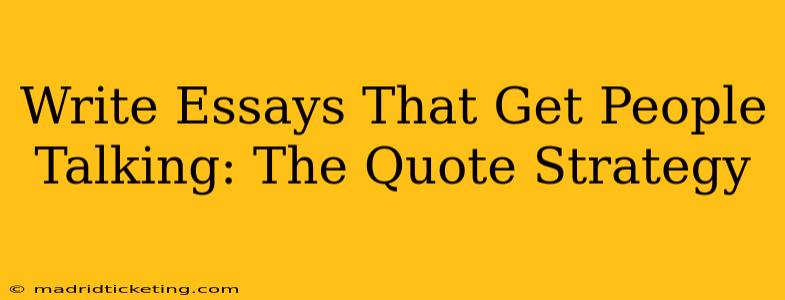The internet is awash with content. To cut through the noise and create essays that spark conversation, you need a strategy that goes beyond compelling arguments and engaging prose. One incredibly effective technique is leveraging the power of quotes. Used strategically, quotes can elevate your essay from merely informative to genuinely thought-provoking, igniting debate and encouraging readers to share their perspectives. This essay explores how to effectively incorporate quotes to achieve this goal.
Why Quotes Work: More Than Just Evidence
Quotes aren't just about supporting your arguments; they're about injecting diverse voices, sparking emotional responses, and framing your own ideas within a broader intellectual context. A well-chosen quote can act as a catalyst, prompting readers to reflect, challenge, and engage with your essay on a deeper level. Think of it as throwing a pebble into a pond—the ripples of discussion spread far beyond the initial impact.
Choosing the Right Quotes: A Strategic Approach
The key isn't simply dropping in any old quote. Consider these factors:
- Relevance: The quote must directly relate to your central argument and add substantial value. A tangential quote, however insightful, will feel out of place.
- Authority: Choose quotes from reputable sources – experts, influential figures, or established texts. This lends credibility to your essay and positions your arguments within a credible framework.
- Impact: The quote should be memorable, concise, and powerfully worded. Aim for quotes that evoke a strong emotional response or stimulate critical thinking.
- Diversity: Don't rely solely on a single source. Including a range of voices – from different backgrounds, disciplines, or historical periods – enriches your essay and demonstrates a broad understanding of your topic.
Integrating Quotes Seamlessly: Avoiding Disruption
Simply dropping a quote into your essay won't guarantee engagement. You need to integrate it smoothly, providing context and analysis. Here's a practical approach:
- Introduce the quote: Briefly explain who said it and the context in which it was originally uttered. This sets the stage for understanding its significance.
- Analyze the quote: Don't just let the quote speak for itself. Offer your own interpretation, explaining its relevance to your argument. Explore its nuances and potential ambiguities.
- Connect to your argument: Explicitly link the quote back to your main point, showcasing how it supports or challenges your perspective. This prevents the quote from becoming an isolated element.
Examples of Effective Quote Integration
Let's say your essay is about the impact of technology on human connection. You could include a quote from Sherry Turkle about the paradox of online intimacy, analyzing its implications for modern relationships and contrasting it with a quote from a more optimistic voice about the potential of technology to connect people across geographical barriers. This creates a dynamic discussion, encouraging readers to form their own opinions.
How to Generate Discussion Beyond the Essay Itself
- Pose open-ended questions: End your essay with a thought-provoking question related to the quotes you've included, prompting readers to continue the conversation in the comments section or on social media.
- Use social media: Share excerpts of your essay, including the impactful quotes, on platforms like Twitter or LinkedIn, encouraging engagement and debate.
- Engage with comments: Respond to reader comments and feedback, fostering a sense of community and further enriching the discussion.
Addressing Common Pitfalls
- Over-quoting: Too many quotes can overwhelm your readers and dilute your own voice. Strive for quality over quantity.
- Misinterpreting quotes: Ensure you accurately understand and interpret the quote before using it. Misinterpretation can undermine your credibility.
- Failing to provide context: Always introduce and analyze your quotes, avoiding leaving them to hang in isolation.
Conclusion: The Power of the Strategic Quote
Mastering the art of incorporating quotes effectively can significantly enhance your essays' impact. By strategically selecting and seamlessly integrating powerful quotes, you can move beyond mere information delivery to create stimulating conversations and foster genuine engagement with your readers, ultimately making your work more memorable and influential. The quote, when used thoughtfully, becomes a bridge connecting your ideas to a larger world of thought and sparking a dialogue that extends far beyond the final page.

